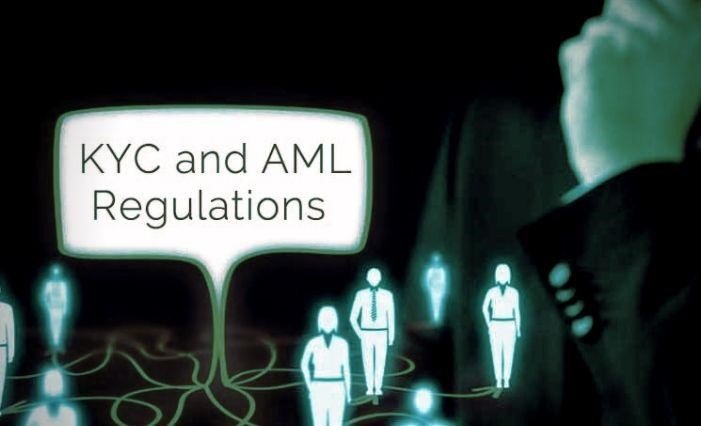Importance of KYC/AML & Cryptocurrency Regulations in Crypto Exchanges

Imagine you are entering your office or organization without your identification card or else imagine you travel abroad without a valid passport. Will it be acceptable? No, right? The same gets applicable for cryptocurrency exchanges when the traders refuse to provide their data to the trading platforms.
On another side, the customers are also benefited by understanding the services of the company and knowing his/her rights. Even countries have their own laws governing with KYC, AML regulations. Thus, these features enhance feasibility from both the ends.
What are KYC/AML & Cryptocurrency Regulations?
As the demand for cryptocurrency exchanges are increasing every day, it has become a need for the exchange platforms to bring in strict security measures. Therefore, KYC and AML were introduced in the trading platforms.
- KYC (Know Your Customers)
KYC is the Customer Identification Process with a set of steps and processes that a company employs to confirm the identity of its users or customers. Usually, the KYC procedure involves the customers to submit identity proof such as Photo IDs, residential address, contact numbers, passports, driving license, etc. The primary motto of Know Your Customer Panel is to make sure unqualified people aren’t let to trade into the crypto exchanges. The unqualified people here refer to the users who have criminal record history, undocumented immigrants, etc. Additionally, it also provides the complete database of information which can act as a proof if any criminal activity persists in the future. Most of the popular online platforms such as forex trading have made it mandatory.
- AML (Anti Money Laundering)
AML refers to the set of procedures, laws, and regulations created to monitor illegal activities in the industry. The activities include market manipulation, tax evasion, misuse of public funds, and other such activities. AML regulations require financial institutions to conduct due-diligence procedures to detect and prevent fraudulent activities.
- Cryptocurrency Regulations
In addition to KYC/AML, Cryptocurrency Regulations are more crucial since a great number of funds are poured into the market. Government and financial organizations feel that they need to closely monitor the transactions. Particularly when it comes to cryptocurrencies, the transactions are completely anonymous and untraceable. Therefore, regulations were being imposed by various countries involved in cryptocurrencies.
Why Crypto Exchanges need KYC/AML & Cryptocurrency Regulations?
Cryptocurrency exchanges handle the KYC process in four general levels:
- Customer Acceptance Policy
- With this policy, it accepts only the clients whose identity is established by conducting due diligence appropriate to the risk profile of the client.
- Customer Identification Program
- This is one of the U.S. Requirements where the financial instruments should verify the identity of individuals who are wishing to conduct financial transactions.
- Keeping an Eye on Transactions
- Seamless monitoring of transactions to ensure regulatory compliance, figuring out suspicious activities.
- Risk Management
- If anything suspicious is found, the final process is to manage the risks.
Based on the details available, the crypto exchanges handle these stages. Usually, there are a couple of crypto exchanges available. Fiat-to-Crypto Exchanges provide a way to enter the cryptocurrency market. With these exchanges, traders can exchange fiat currencies like Dollars, Euros, Rupees, etc. While on the other hand, Crypto-to-Crypto Exchanges allows the users to exchange cryptocurrency for other cryptocurrencies.
Popular examples of Fiat-to-Crypto Exchanges include Coinbase, Kraken, Bitfinex, Gemini, Bittrex, etc. Fiat-to-Crypto Exchanges do KYC at least to a certain extent since they deal with Fiat currencies. Here is how they handle the KYC process, according to Cointelegraph:
- In Coinbase, there is no KYC to send, receive the cryptocurrencies. While in the case of AML, the transaction will be monitored continuously.
- In Gemini, KYC becomes applicable once the account is activated. Here AML is monitored through Nasdaq’s market surveillance team.
- In Bitfinex, KYC is applicable upon Fiat trading not for Crypto trading. While AML is monitored through Irisium’s market surveillance team.
On the flip side, Crypto-to-Crypto Exchanges such as Binance, OKEx, Huobi, etc handle the KYC process like this:
- In the case of Binance, there is no KYC required upto 2 BTC. AML is monitored by Chain analysis trade monitoring solution.
- In OKEx, KYC is not required for crypto deposits. To withdraw and make use of advanced features, KYC will be required. While the source of AML monitoring is still unknown.
Thus, when creating a cryptocurrency exchange it is crucial that your exchange comes with KYC/AML to get rid of fraudulent activities.
Is KYC/AML & Crypto Regulations here to stay?